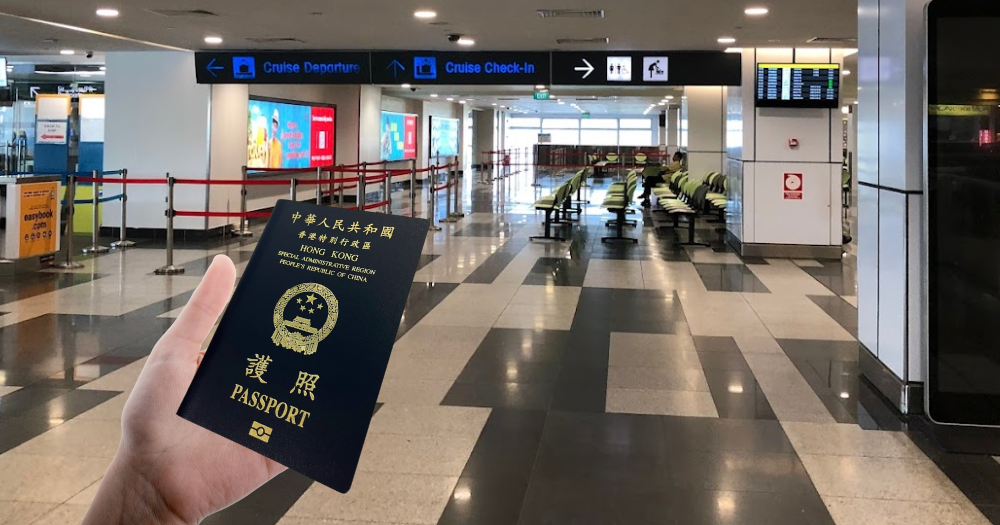A 33-year-old woman from China, Cheng Yajun, decided to impersonate a 22-year-old Hong Kong student so that she could split the 200,000 yuan (S$37,200) cash reward offered by a Chinese man.
To make Cheng's fake identity more convincing, her friend passed her a false Hong Kong Special Administrative Region (HKSAR) passport, which Cheng later attempted to use to clear departure immigration in Singapore.
Cheng was sentenced to six months in jail on Jun. 4 after pleading guilty to one count of possessing a false foreign travel document, reported Shin Min Daily News.
What happened
According to court documents seen by Mothership, the Chinese man, surnamed Liu, wanted Cheng's friend, identified as "Xiao Mao", to come to Singapore to accompany him after becoming acquainted with her.
In return, Liu offered Xiao Mao a 200,000 yuan (S$37,200) cash reward.
However, as Xiao Mao was unable to come to Singapore, she proposed an alternative arrangement in which she would introduce her 22-year-old friend, who was a student from Hong Kong, to accompany Liu instead.
After Liu agreed to the arrangement, Xiao Mao asked Cheng to impersonate this "student" and offered to split the cash reward from Liu equally with her, to which Cheng agreed.
Court documents seen by Mothership did not disclose why Xiao Mao was unable to come to Singapore.
Xiao Mao gave Cheng a false passport
On Apr. 14, Xiao Mao passed Cheng a false HKSAR passport issued under the particulars of a woman of another name.
It also stated the passport holder was born in July 2002.
Xiao Mao informed Cheng that the passport was a false travel document, which she had bought from an unknown agent.
She also said the purpose of the passport was for Cheng to impersonate the identity set out in the HKSAR passport so that Liu would believe Cheng was the "student".
Xiao Mao subsequently arranged for Cheng to travel from mainland China to Hong Kong before flying to Singapore using Cheng's Chinese passport.
Cheng used Chinese passport for immigration clearance
On Apr. 15, Cheng arrived at Changi Airport Terminal 4 and was granted a 30-day visit pass after presenting her Chinese passport for arrival immigration clearance.
She then met Liu in a hotel room at Marina Bay Sands and spent the night with him.
Later on, Liu transferred the first payment of 50,000 yuan (S$9,300) to Cheng's bank account in China.
Used HKSAR passport to buy tickets to Batam
On Apr. 16, Liu brought Cheng to the Singapore Cruise Centre with his friends for a day trip to Batam, Indonesia.
To maintain her façade, Cheng handed over the false HKSAR passport, instead of her Chinese passport, to Liu's friend to purchase the ferry ticket.
Subsequently, Cheng proceeded to the Singapore Cruise Centre Regional Ferry Terminal (RFTD) Departure hall and attempted to use the false HKSAR passport for departure immigration clearance at the automated immigration lane.
As the automated immigration lane was unable to process the HKSAR passport, Cheng was directed to seek immigration clearance at the manual counter.
Produced HKSAR passport to ICA officer
At the counter, Cheng produced the HKSAR passport to the Immigration and Checkpoints Authority (ICA) officer.
After noticing the officer experienced difficulty in processing the HKSAR passport, Cheng produced her Chinese passport and informed the officer that the Chinese passport was her actual passport.
She was then referred to the ICA RFTD duty office for further investigations.
At around 10am, Cheng was arrested by ICA officers and referred to ICA's investigation branch for investigations.
The Hong Kong Immigration Department confirmed that the HKSAR passport in Cheng's possession was a counterfeit passport and was not issued by the relevant authority.
For each count of possessing a false foreign travel document, Cheng could have been fined up to S$10,000, jailed for up to 10 years, or both.
Top images via Canva & Google Maps; photo for illustration purposes only
If you like what you read, follow us on Facebook, Instagram, Twitter and Telegram to get the latest updates.



